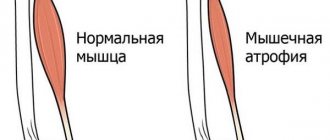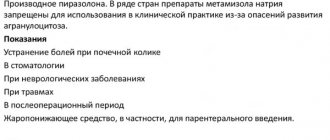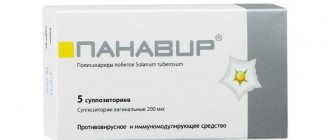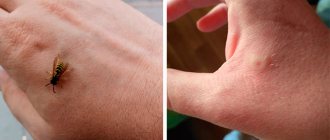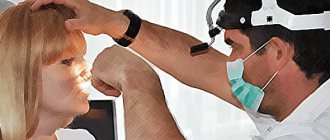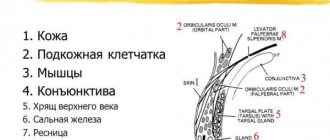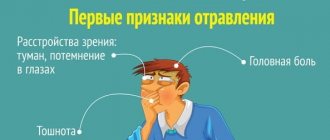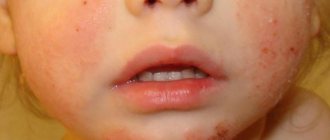Today we will talk about drops with an antiallergic effect Fenistil, we will analyze the existing annotation for the drug, and we will give instructions for use for children under one year of age.
If the pharmaceutical industry offers an adult with allergies a lot of options for antihistamines, then treating a baby for allergy symptoms is quite difficult; any mother cares about the health of her baby and wants to find the safest possible drug, which is also approved for use from the first days of life.
Most medications are approved for use from the age of six months and older. Fenistil drops are the only drug with an antiallergic effect that can be given to infants at 1 month of age.
The medicine effectively relieves itching, swelling, redness, helps parents treat atopic dermatitis, food allergies, eliminate the consequences of insect bites, and relieve irritation of the epidermis in children.
Composition and release form of the drug Fenistil
Dimentindene maleate is the active component of antiallergic drops for infants and children under 12 years of age.
The active substance quickly narrows capillaries, reduces the production of histamine, and exhibits an active antipruritic effect.
The composition of the medicine Fenistil includes Dimentindene maleate, liquid sorbitol, purified water, and other ingredients. Without ethanol - alcohol in the composition.
Drops with antiallergic effect are in a convenient bottle. It is easy to measure the required amount of the drug thanks to the dropper dispenser. The volume of the allergy remedy is 20 ml.
What help can be provided to the victim?
If a person has an overdose of fenistil, then immediate first aid should be provided, which looks like this:
- The patient is given to drink about a liter of water at a time with the addition of potassium permanganate or table salt, then vomiting is artificially induced by pressing on the root of the tongue. This procedure is performed several times in order to remove as much as possible the medicine that has not had time to be absorbed into the mucosa. For young children, under 3 years old, gastric lavage is not performed at home - this will quickly cause dehydration of a weak body. They only have their stomach washed in the hospital through a special tube.
- Give the patient a saline laxative, for example, magnesium sulfate.
- They give you any adsorbent you have in the house - atoxyl, smecta, polysorb, activated carbon.
Before starting emergency care, be sure to call a doctor. Especially if intoxication occurs in a child, pregnant woman or elderly person. The doctor must be shown the packaging of the medicine that caused the poisoning . This way, making a diagnosis and prescribing adequate treatment will be faster.
Protocol for the treatment of fenistil overdose in a hospital
If the patient's condition is very serious, he is taken to a medical facility and placed in the intensive care unit. They provide the following medical care:
- Perform artificial ventilation.
- Forced diuresis is performed to speed up drug excretion by the kidneys.
- Drugs are prescribed to treat neurological disorders.
- According to indications, medications are prescribed to normalize blood pressure.
- If tachycardia is present, beta-blockers are prescribed.
If necessary, symptomatic treatment is prescribed, which is aimed at stabilizing the functioning of the organs.
Medicinal action of Fenistil
The drug exhibits the following properties:
- antiallergic;
- antipruritic;
- painkillers;
- there is a sedative effect.
Features of the effect on the body:
- the antiallergic effect of the drug Fenistil drops in some children is noticeable after a quarter of an hour;
- in most young patients, allergy symptoms subside after 30–45 minutes;
- the components of the drug only eliminate negative symptoms, but do not cure the disease;
- the remnants of the drug are excreted in urine and bile;
- The optimal duration of taking an antiallergic drug is 7 days.
If after this period the signs of an allergic reaction do not completely disappear, you should visit your pediatrician and allergist again for consultation. A more extensive examination of the child will be required.
When is an overdose possible?
An overdose of fenistil can only occur due to carelessness or inattention:
- the therapeutic dose prescribed by the doctor was mistakenly exceeded;
- the child found a package of medicine and consumed a large amount;
- the medication was used as a suicidal drug and was taken simultaneously with alcohol.
You can start taking an antiallergic drug only as prescribed by your doctor and only in the dosage that he indicated.
Indications for use of Fenistil
An antiallergic drug is recommended to eliminate acute symptoms in the following cases:
- allergic dermatitis and other dermatitis of various types;
- allergic rash after a negative response to components of products, medications, after insect bites;
- throat irritation due to pharyngitis, colds; various manifestations of food allergies;
- redness, itching, pain after household and sunburn;
- elimination of itching in infectious diseases: rubella, chickenpox;
- hives;
- hay fever;
- year-round allergic rhinitis;
- angioedema;
- Quincke's edema.
Contraindications for Fenstyl drops
The drug should not be given in the following cases:
- low weight of the baby, the child was born premature;
- intolerance to dimentindene or additional ingredients;
- chronic pathologies of the gallbladder and lungs;
- bronchial asthma;
- hypersensitivity in the baby.
Important! Age limit – 1 month. In exceptional cases, it is possible to take an antiallergic drug to newborns.
Fenistil should be prescribed with caution to patients with chronic obstructive pulmonary diseases and epilepsy.
Instructions for use and dosage of Fenistil
The frequency of administration and dosage are determined by the pediatrician depending on the severity of the symptoms and the age of the young patient.
It is mandatory to take into account the baby’s weight: per kilogram of body weight, you are allowed to take no more than 0.1 mg of the active substance.
The daily dosage should be divided into three doses; exceeding the norm is prohibited.
Rules for using Fenistil
- Do not mix the medicine with hot liquid;
- the best option is to give the baby the required number of drops undiluted or add to warm breast milk (in a bottle) / to the nutritional formula;
- in the first days of use, you need to monitor the child: the sedative effect in some children causes the development of night apnea;
- if you are prone to drowsiness, you need to divide a single dose: give part of the drops before bed, the second half of the drug - before morning feeding.
Frequency and dosage
Fenistil in drops: age from 1 to 12 months.
- Give the child 3 to 10 drops three times a day;
- from one to three years - from 10 to 15 drops in the morning, afternoon and evening;
- age 4–12 years – higher dosage: three times a day from 15 to 20 drops.
How to calculate the dosage: 0.1 mg of active substance is enough per 1 kg of weight; active ingredient in an amount of 1 mg is 20 drops.
Example:
- the child weighs 5 kg, age – 4 months;
- daily dosage: 0.1 mg of active substance x body weight (5 kg). It turns out 0.5 g mg of dimentindene or 10 drops;
- You need to take the antiallergic drug three times a day.
- It turns out 10:3 = 3 drops per dose.
First aid for overdose of Fenistil
In case of overdose, immediate measures must be taken:
- Gastric lavage (drink a large amount (1–1.5 l) of warm water or a slightly pink solution of potassium permanganate (potassium permanganate) and provoke vomiting by pressing on the root of the tongue). Attention! This method cannot be used in children under the first 3 years of life! In this case, gastric lavage is performed using a gastric tube in a hospital setting.
- Take a saline laxative (Magnesium sulfate);
- Take an enterosorbent (for example, Atoxil, Polysorb according to the scheme or Activated Carbon at the rate of 1 tablet per 10 kg of body weight).
Using Fenistil drops before vaccinations
Many pediatricians prescribe a safe, effective drug to reduce the risk of side effects and allergic reactions before vaccinations. It is important for parents to coordinate actions with their local doctor.
Recommendations:
- Start taking medication for preventive purposes 5 days before the vaccination date;
- after vaccination, give an antiallergic drug for another three to five days;
- The optimal frequency of administration is morning and evening;
- To prevent a negative response from the body, 4-5 drops are enough for infants up to one year old, from 12 to 24 months - 10, after three years - 20 drops are enough.
Side effects of Fenistil drops
A study of the effect of dimentinden on the body showed that the antiallergic drug Fenistil in the form of drops rarely causes negative reactions. Severe manifestations have been recorded in isolated cases.
Most often, children experience the following symptoms:
- dry mouth;
- drowsiness;
- headache;
- muscle spasms;
- overexcitement;
- nausea;
- swelling of tissues;
- skin rashes.
On a note! Careful monitoring of the baby's reaction to the antiallergic drug Fenistil will help prevent the development of side effects.
If there are negative changes in the child’s well-being or behavior, you should consult a doctor.
Fenistil overdose
Do not exceed the recommended dosage: the drug often causes drowsiness, and sudden holding of breath (night apnea) is possible.
For this reason, you must strictly follow the norm and measure the amount of liquid using a dropper dispenser.
It is not difficult to recognize an overdose: the child develops negative signs:
- flushed face;
- convulsions occur;
- fever develops;
- the child is overexcited and does not sleep well;
- difficulty urinating;
- blood pressure decreases.
How to eliminate the consequences of an overdose?
In case of negative symptoms after excessive use of an antihistamine, show the child to a doctor as soon as possible; in case of severe symptoms, especially in babies under one year old, call an ambulance.
When is medical attention required?
Medical attention is needed if:
- a child, pregnant woman or elderly person was injured;
- after first aid is provided, the victim’s condition does not improve or worsens;
- active neurological symptoms (uncontrolled agitation, convulsions, disorientation, incoordination, etc.);
- the victim is unavailable or has limited contact;
- persistent fever not controlled by antipyretic drugs;
- sudden tachycardia or decrease in blood pressure below 80/50 mmHg. Art.;
- acute urinary retention.
If necessary, the emergency medical team will hospitalize the victim to a specialized department of the hospital, where he will continue to receive medical care:
- artificial ventilation, oxygen therapy;
- forced diuresis (taking diuretics in combination with a water load of alkaline drinking (up to 5 liters per day) to enhance drug excretion by the kidneys);
- symptomatic treatment of developed neurological complications;
- administration of vasoconstrictor drugs with a sharp decrease in blood pressure (Norepinephrine, Dopamine);
- for tachycardia - β-blockers.
Fenistil cost - price
The antiallergic product was produced in Switzerland. The pharmaceutical company Novartis offers an effective, fairly safe remedy to eliminate allergy symptoms in the youngest patients.
The price of Fenistil drops is quite high - from 430 to 500 rubles for a 20 ml bottle of the drug.
If allergies occur in children aged 1 month, parents have no choice: other antihistamines are not suitable for such young patients.
Fenistil's analogs
For use at an early age, the pharmaceutical industry offers a limited list of antihistamines. At the age of 1 month, you can give Fenistil drops and apply Fenistil-gel to the affected areas of the skin.
Medicines eliminate skin itching, relieve pain in problem areas, and soothe the little patient.
From 4 months: Advantan (cream).
From 12 months: Zyrtec (drops). Desal (syrup). Cetirizine (drops). Erius (syrup). Zodak (drops).
Analogues of Fenistil drops, approved for use from 2 years of age: Suprastinex (drops). Xyzal (drops). Claritin (syrup). Cetrine (syrup).
special instructions
- In children under 6 years of age, antihistamines may cause increased excitability.
- Drops should not be exposed to high temperatures.
- When administered to infants, they should be added to a bottle of warm baby food immediately before feeding.
- If the child is already being spoon-fed, the drops can be given undiluted. The drops have a pleasant taste.
- Do not exceed the recommended dose.
- The drug is not effective for itching associated with cholestasis.
Influence on the ability to drive vehicles and operate machinery in adults
Fenistil may impair attention, so it should be taken with caution when driving a car, operating machinery, or performing other types of work that require increased attention.
Pregnancy and lactation
- Fenistil is contraindicated in the first trimester of pregnancy and during lactation (breastfeeding).
- The use of Fenistil in the second and third trimesters of pregnancy is possible under the supervision of a physician, only if the expected benefit to the mother outweighs the potential risk to the fetus.
Overdose symptoms
Overdose is mainly observed with excessive consumption of drops or capsules. The symptoms are quite specific and are associated with disruption of the central nervous system:
- Lethargy, lack of response to stimuli, decreased motor activity, and abnormal drowsiness are observed (more often typical for adult patients).
- Causeless anxiety, motor and speech excitability, hallucinations, dilated pupils, mental state disturbance (typical for children).
- Loss of coordination.
- Decreased blood pressure and unstable heart function.
- Cramps.
- Thirst that cannot be quenched and dry mouth.
- Redness of the skin on the face, neck and chest.
- Malfunctions of the urinary system, there may be complete urinary retention.
- Hyperthermia to life-threatening levels.
And although to date not a single fatal case of fenistil overdose has been registered in the country, theoretically this could occur due to respiratory or cardiovascular paralysis.
Reviews of Fenistil for parents
The drug Fenistil in the form of drops is well known to mothers from different countries. A modern antiallergic drug shows good results in the treatment of atopic dermatitis, eliminating itching in childhood infectious diseases, eczema, and allergies to various types of food.
The main advantage is the possibility of use in the youngest patients, at the age of 1 month. The medicine rarely causes side effects, the main symptoms are quite “mild”: drowsiness, nausea, dry mouth.
Parents and pediatricians recommend monitoring the baby’s reaction: some children experience sleep apnea. In this case, before bedtime you need to give only half of the single dose, the child will take the rest in the morning.
For allergic reactions in children under one year of age, Fenistil drops with dimentinden give a quick effect.
The modern Swiss drug is suitable for eliminating the characteristic symptoms of allergies in babies aged one month and older. The antihistamine Fenistil with an antipruritic and analgesic effect alleviates the condition of a small patient.
Before using the drug, parents should consult a pediatrician and carefully study the instructions. Do not exceed the daily or single dosage: negative reactions develop.
General characteristics of the drug
Fenistil helps relieve allergy symptoms and skin itching. It blocks H1-histamine receptors. Histamine, which can no longer bind to specific receptors, has no effect on cells and substances that cause allergies are not produced. Although the drug breaks the chain of pathological changes that activate the allergic process, it does not affect the cause of the disease at all. Even when taking fenistil, histamine continues to be produced in the bloodstream, but does not cause an allergic reaction.
The medication is available in the form of a 0.1% gel, drops and capsules for oral administration.
Fenistil in the form of drops is allowed to be used in pediatric practice starting from 1 month of a child’s life. The dosage of the drug is calculated by the pediatrician based on the baby’s weight and the severity of the disease.
It is worth remembering that the drug has a depressant effect on the central nervous system. Therefore, in children under one year old, it can cause respiratory arrest or sudden infant death syndrome!
The medicine is not recommended for pregnant women in the first trimester . Further treatment is possible after weighing all possible risks for the mother and fetus.
Fenistil enhances the inhibitory effect of hypnotics and antidepressants. If the medicine is used simultaneously with alcohol, the speed of the psychomotor reaction is significantly reduced.


